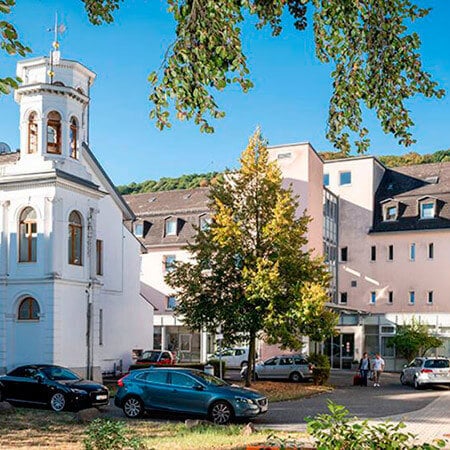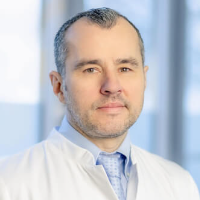Lung Cancer — Embolization of the Bleeding Vessels: treatment in the Best Hospitals in the World
Treatment prices are regulated by national law of the corresponding countries, but can also include additional hospital coefficients. In order to receive the individual cost calculation, please send us the request and medical records.

Department of Adult and Pediatric Diagnostic, Interventional Radiology
The Department of Adult and Pediatric Diagnostic, Interventional Radiology provides the full range of services in these fields and specializes in conducting radiologic examinations, high-intensity focused ultrasound (HIFU) therapy, vascular, oncological, orthopedic and urologic interventions. The department includes specialized Sections for Gynecologic, Pediatric and Orthopedic Radiology.






Department of Adult and Pediatric Diagnostic, Interventional Radiology
The Department of Adult and Pediatric Diagnostic, Interventional Radiology offers all modern methods of high-precision imaging diagnostics and minimally invasive imaging-guided therapeutic procedures. The department meets all radiation protection standards, which are especially important in the diagnostics of children and adolescents. The basis of successful clinical practice of the medical facility is a progressive technological base and the best highly qualified specialists.



Department of Interventional Radiology
The Department of Interventional Radiology offers the full range of modern diagnostic procedures using ionizing radiation, image-guided tissue sampling (biopsy), and minimally invasive therapeutic procedures. Patients may be seen on an inpatient or outpatient basis. To achieve optimal results, the department works closely with specialists in radiation therapy, oncology, neurology, neurosurgery and neuro-oncology, as well as urology, orthopedics, pain management, and palliative care. This collaboration helps ensure an accurate diagnosis and the most effective treatment.




Lung cancer is a group of malignant tumors. Oncology develops due to a mutation in the cells of the lungs. Lung cancer more often affects the right lung than the left, but the upper lobes of the organ also suffer.
Content
- Overview
- Diagnostics
- Treatment
- Where can I undergo cancer treatment by embolization abroad?
- The cost of treatment by embolization
- How can I undergo cancer treatment by embolization abroad?
Overview
Lung cancer is one of the most frequently diagnosed and dangerous types of oncology, regardless of the lung tumor type.
Depending on the histological peculiarities, lung cancer may progress rapidly or develop over many years. It is often not limited to the lungs – the tumor can spread metastases to other organs and tissues of the human body.
The exact causes that can stimulate the development of a malignant tumor have not been determined. However, there are still some factors that can facilitate the malignant transformation of healthy bronchial and pulmonary cells, including:
- Smoking. It is this bad habit that in 90% of cases becomes the main reason for the development of a deadly disease. This is connected with nicotine and other carcinogenic substances that a person inhales with tobacco smoke. You also need to understand that passive smokers have the high risk of developing lung cancer. The development of oncology has correlation with the number of cigarettes smoked.
- Chemical substances. The greatest danger to the human body is contact with such substances as asbestos, arsenic, radon, cadmium, nickel, and chromium. People who systematically inhale or have contact with toxic fumes are at risk of cancer.
- Ecology. Systematic inhalation of dust increases the risk of lung cancer.
Diagnostics
Diagnosing lung cancer at the first stage of the development of the disease is not easy. However, the correct use of a full range of innovative techniques and laboratory tests makes it possible to identify a neoplasm at the first stages. This significantly increases the chances of successful treatment, up to patients’ complete cure. For detecting metastases, MRI and ultrasound scanning are used. Complete blood count and biochemical blood tests can be prescribed as well in order to assess the general health condition.
The most simple and cost-effective technique for diagnosing lung cancer is lateral radiography. To confirm the diagnosis, a computed tomography (CT) of the chest and abdomen is used. In patients with pleural mesothelioma, this type of diagnostics is mandatory. The latest PET-CT method is used to reveal the disease in patients with small-cell lung cancer and Pancoast tumor (a tumor of the superior sulcus of the lung), as well as in patients who are eligible for the radical resection.
Along with the main methods of diagnosing cancer, doctors also use several additional methods that allow them to determine the type of neoplasm, and, if it is malignant, the stage of cancer. Bronchoscopy has a special role among the additional diagnostic techniques. In some cases, the technique makes it possible to see the tumor in the lumen of the bronchi that infiltrates the lungs or compresses them.
Bronchoscopy is performed by introducing a flexible tube with a camera and a lens into the bronchi and allows a specialist to assess the size and structure of the tumor, as well as take a tissue sample for further histological examination. With the help of endoscopic examination, the doctors assess the nature of tumor growth, its relation to the surrounding healthy tissues, presence of bleeding vessels, etc.
Treatment
Embolization is used to treat many diseases. Embolization therapy for cancer treatment is used widely, primarily because of its effectiveness and minimally invasiveness. Embolization is painless and does not require anesthesia. In addition, the surgical instrument is inserted through an artery puncture, which means there is no surgical wound.
Embolization is performed by surgeons in a specially equipped angiographic operating room. Angiography is always performed before embolization. An X-ray contrast agent is injected into the blood vessels. After that an X-ray image is recorded in digital video format. This helps the doctor assess the location and structure of the vessels, and determine which arteries supply the tumor with blood.
Most often, therapy is performed under local anesthesia. In rare cases, it is better to use general anesthesia. Four hours before the embolization procedure, the patients should limit food intake. Sometimes patients should take sedatives.
In most cases, access through the femoral artery is used. This is the most typical access for all angiographic studies and interventions. Nevertheless, other arteries in other body regions can also be used, e.g. radial artery on the wrist, brachial artery in the elbow bend, etc. The doctor makes a small puncture, inserts a special catheter no larger than 1.5 mm into the artery, and puts it forward until a catheter reaches the target vessel. Emboli are inserted through the catheter into the vessel and block its lumen.
Where can I undergo cancer treatment by embolization abroad?
Health tourism is becoming more and more popular these days, as medicine abroad often ensures a much better quality of treatment with embolization.
The following hospitals show the best success rates in treatment with embolization:
- University Hospital Frankfurt am Main, Germany
- Memorial Bahcelievler Hospital Istanbul, Turkey
- University Hospital Halle (Saale), Germany
- University Hospital Muenster, Germany
- University Hospital Wuppertal, Germany
You can find more information about the hospitals on the Booking Health website.
The cost of treatment by embolization
The prices in hospitals listed on the Booking Health website are relatively low. With Booking Health, you can undergo treatment by embolization at an affordable price.
The cost of treatment varies, as the price depends on the hospital, the specifics of the disease, and the complexity of its treatment.
The cost of treatment with embolization in Germany is 8,170-13,669 EUR.
The cost of treatment with embolization in Turkey is 5,118-5,301 EUR.
You might want to consider the cost of possible additional procedures and follow-up care. Therefore, the ultimate cost of treatment may differ from the initial price.
To make sure that the overall cost of treatment is suitable for you, contact us by leaving the request on the Booking Health website.
How can I undergo cancer treatment by embolization abroad?
It is not easy to self-organize any treatment abroad. It requires certain knowledge and expertise. Thus, it is safer, easier, and less stressful to use the services of a medical tourism agency.
As the largest and most transparent medical tourism agency in the world, Booking Health has up-to-date information about embolization in the best hospitals. We will help you select the right clinic taking into account your wishes for treatment.
We want to help you and take on all the troubles. You can be free of unnecessary stress, while Booking Health takes care of all organizational issues regarding the treatment. Our services are aimed at undergoing treatment with embolization safely and successfully.
Medical tourism can be easy! All you need to do is to leave a request on the Booking Health website, and our manager will contact you shortly.
Authors:
The article was edited by medical experts, board certified doctors Dr. Vadim Zhiliuk and Dr. Sergey Pashchenko. For the treatment of the conditions referred to in the article, you must consult a doctor; the information in the article is not intended for self-medication!
Sources:

